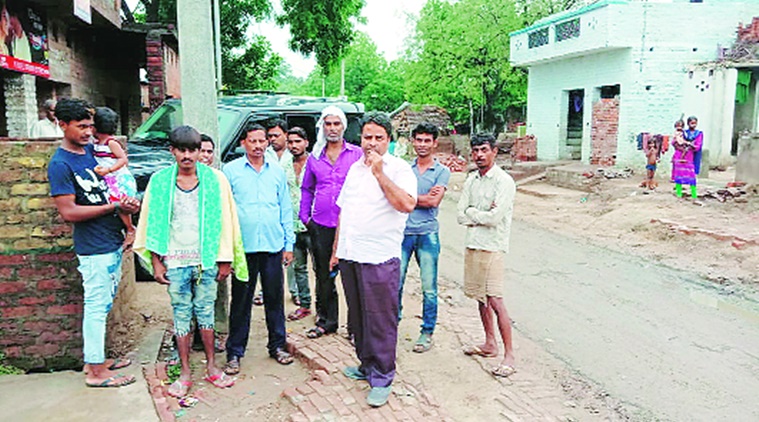- India
- International
Textile industry faces labour crunch: Migrants happy with MNREGA work in UP as Surat units struggle
Home to nearly 16 lakh migrant workers from Bihar, Odisha, Uttar Pradesh, Rajasthan, Madhya Pradesh, Jharkhand, and Uttarakhand, employed in its textile mills, Surat saw nearly six incidents of violence in its labour colonies, by workers demanding to return home, walking home in protest, confronting police
 Labour contractor Kamran Usmani (in white shirt) at a village in Sonbhadra district of UP with his workers. (Express Photo)
Labour contractor Kamran Usmani (in white shirt) at a village in Sonbhadra district of UP with his workers. (Express Photo)
On May 20, Dharmendra Bagda, 32, took a Shramik Special train from Surat and returned home to Pithora in Fatehpur district of Uttar Pradesh. For 18 years, Bagda worked as a loop operator in a textile dyeing and printing factory at Sachin GIDC, earning Rs 390 per day working for 12 hours every day, including in night shifts, till there was no work and wages in March and April.
Four of them staying in a 10×10 feet quarter had to share Rs 3,000 room rent. Back home with his wife and 5-year-old daughter, he enrolled as an MNREGA worker and earns Rs 350 for a six-hour shift daily, digging ponds and roads. Rest of the time he helps his father in farming their three-bigha land.
Bagda has “dark memories” of lockdown and is in no mood to return. “I would save Rs 2,500 – Rs 3,000 every month from my salary of Rs 15,000 – Rs 18,000 (including overtime wages) and take home new clothes and gifts for my family during the annual visit, usually Diwali. The lockdown was all about standing in queue for food, that too, typical Gujarati cuisine… The mill shut down on March 23, and for two months, I was locked indoors, missing my family and counting the days… Finally our labour contractor arranged railway tickets for us to get back home in UP,” says Bagda.
He says he never missed his family as much as he did during the lockdown. “Now I am happy staying at home, having enrolled for MGNREGA work and earning good money. I will stay here till the MNREGA work gets over and then return to Surat,” he adds.
Nirbhay Raj, 35, of Banda district in UP, employed in a dyeing and printing unit in Pandesara, also returned home to be with his wife and two children. Like Bagda, he had no wages in March and April.

“During the lockdown, we had to survive with what we had. Shops were closed and we were almost starving… In the labour colonies, we shared food till an NGO started serving us food. Now I started working in an agricultural field in our village, earning Rs 200 per day. My father owns some land, which he tills. In July, I will get better work in the farms and will return to Surat only in August,” says Raj.
Home to nearly 16 lakh migrant workers from Bihar, Odisha, Uttar Pradesh, Rajasthan, Madhya Pradesh, Jharkhand, and Uttarakhand, employed in its textile mills, Surat saw nearly six incidents of violence in its labour colonies, by workers demanding to return home, walking home in protest, confronting police. Some of them rode bicycles to their homes in UP.
Now textile industry leaders in Surat are trying to get the workers back to operate their units. Sources say that only 30 per cent of the migrants, mostly who had families here, stayed back and started work. Nearly 6.8 lakh migrants returned by 440 trains from Surat alone, which was the highest from a single destination in Gujarat.
Kamran Usmani, 60, from Azamgarh in UP and settled in Surat, holds the contract of supplying labourers to five dyeing and printing mills in Sachin and Pandesara. He is now camping in UP travelling from district to district trying to convince his workforce to return. Over the past 15 days, he visited Banda, Hamirpur, Chtirapur, Kanpur, and Fatehpur among others.
“I have been supplying labour to the industries for 30 years. I own 95 rooms that are given on rent to such labourers but now all the rooms are empty. The labourers are refusing to return… We told them that their wages will be increased and that their journey back to Surat would be free. Some of them are convinced and are ready to start back by July 1. I have arranged for private luxury buses and hope that over 500 workers will return,” says Usmani.
He says he stood with them during the lockdown and supplied them rations. “I sent around 5,000 labourers to UP by Shramik Special trains. No labourer stood in line to get ticket, I arranged it all for them using my contacts,” he says.
Ashok Shrivastav, who has a labour contract in five dyeing and printing units in Sachin and Pandesara GIDC in Surat, has been in UP since June 15, trying to bring the labourers back to Surat. “Now with the textile factories reopening, we are facing immense pressure from factory owners to bring the labourers back to Surat. I visited Amethi, Sonbhadra, Mirzapur, Prayagraj, and other districts trying to talk to labourers to return, but they refused. They say they suffered a lot during the lockdown as the factory owners did not provide them food or wages,” says Shrivastav.
A few labourers whom he had helped out have agreed to return after assurance to their parents and family members that he would take full care of them. “We have booked one private luxury bus, and it will leave from UP in the first week of July. We are also going to other districts to bring back migrant workers to Surat,” he adds.
Surat has 360 dyeing and printing mills, six lakh powerloom machines, and 65,000 textile trading shops. On June 23, the South Gujarat Chamber of Commerce and Industry (SGCCI) president Ketan Desai, vice-president Dinesh Navadia and members of different textile associations met Surat Municipal Commissioner BN Pani, to work out ways to reopen the industry.
South Gujarat Textile Processing Association president Jitu Vakharia said, “Only 20 per cent of dyeing mills started with only one shift. There are no labourers here in Surat, we have requested labour contractors to bring them back.”
He says the association has written to Chief minister Vijay Rupani and Union Railway minister Piyush Goyal, requesting free train services to bring the labourers back. “If the labourers are not brought back, the industry will become paralysed,” says Vakharia.
On June 25, Sachin Industrial Association called a meeting with Assistant Labour Commissioner JL Patel, at Sachin GIDC, in which members of the Weavers’ Association, Chemical Company Association and Dyeing and Printing Association were present. Only 15 per cent of the units are functional here.
According to SIA president Mahendra Ramolia, the association requested the labour department to bring back the workers. “We have requested state government to talk to the Central government and make some arrangements to start Shramik Special trains from UP and Bihar to Surat. We have sent a five-member team to UP to talk to labourers and convince them to return,” he said and added, “With rise in the numbers of Covid-19 cases in Surat, the labourers are also scared to return.”
Apr 25: Latest News
- 01
- 02
- 03
- 04
- 05







































